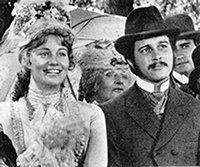
An Analysis of Daisy Miler
When I first read this work I found it to be a narrative of the quintessential American faux-pas. It is the story of an American girl in a new land who does not know how to act, and does not take the advice given to her about social norms. The story climaxes with Daisy's death and I, personally find this to be one of the most important parts of the story. However, I think there are other important factors within this story that are worth examining.
Social Factors
What is power of another's impression? Daisy pretends like she is not affected by the cloud of gossip that surrounds her but in small ways she shows that she is really hurt by what is said about her. She is eventually left with only one real companion, Mr. Giovanelli, who is so entrhralled by her that he forgets to take care of her. This results in her eventual death. Her complete disregard for society leaves her literally, out in the cold and dead for it. Perhaps Daisy never heard of the saying "When in Rome do as the Romans do." I believe that there is an important message suggesting that to be part of the group, though it may go against one's style, is more important than being alone.
Daisy is, despite her beauty, a quintessential Ugly American. I believe that James also wished to address the issue of American ignorance and lack of culture through Daisy, a beautiful and innocent woman. No matter how beautiful and loving she is, her looks won't buy her acceptance into the world of European society if she continues to behave improperly. So perhaps when we, Americans, decide to go abroad we should not just try to have things our way but try to be sensitive to local cultures and customs.
Ideas
Throughout the novel there is much emphasis placed on Daisy's innocence. Mrs. Walker and Mrs. Costello find her just plain dumb but Winterbourne chooses to find her beautiful and innocent. To me it seems like Daisy is portrayed as a beautiful princess in a land of uptight old crones. It seems like James is trying to say that everything that is good and pure is short-lived, as is Daisy. The pure innocent girl could not survive because anything that pure must either be tainted, or die.
Giovanelli v. Winterbourne.
Despite the name, Winterbourne, I found Giovanelli to be the bearer of coldness throughout htis story. One has to question his complete disregard for Daisy's reputation. Yes, of course he had other things on his mind but at Daisy's funeral he implies that he genuinely cared for her. And yet, unlike Winterbourne, he makes no effort to keep help her keep her reputation. Consequently, she loses all ties to an outside world except him. Giovanelli is also too preocupied with being in her company to make sure she doesn't get sick. Upon their first meeting Winterbourne describes Giovanelli as a very cleverly disguised gentleman. However, I think Giovanelli has more to disguse than his status as a gentleman. I believe he is part demon, coveting a beautiful woman but eventually taking her with him to the underworld.
On the contrary Winterbourne, despite his formal demeanor, genuinely cares for Daisy. Every attempt to save her is made by him. In the end we even question whether or not he had true feelings for her (I believe that he did.) I think that if Daisy had chosen Winterbourne's company, perhaps she would not have suffered such a creul fate.
"Innocence always calls mutely for protection when we would be so much wiser to guard ourselves against it: innocence is like a dumb leper who has lost his bell, wandering the world, meaning no harm." Greene, Graham. The Quiet American pt. 1 ch. 3

0 Comments:
Post a Comment
<< Home